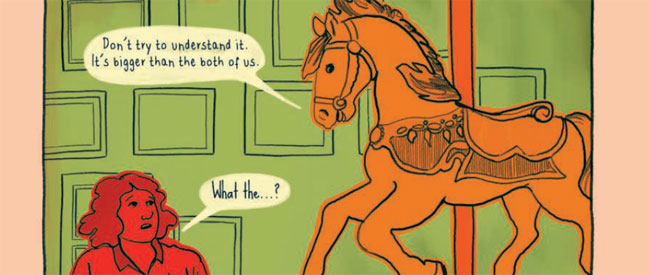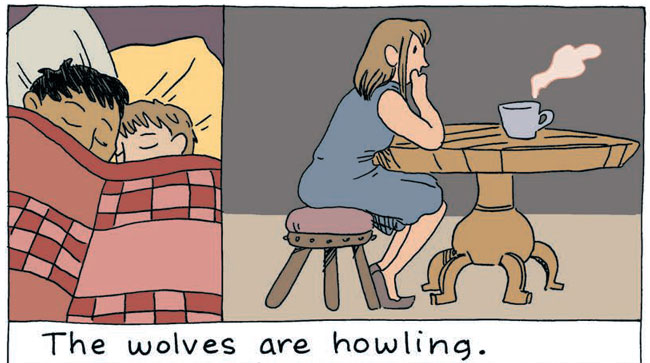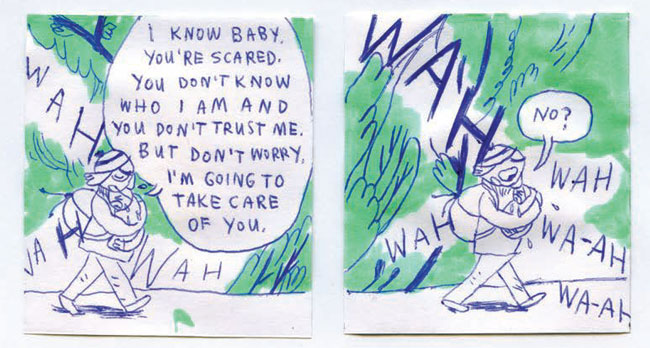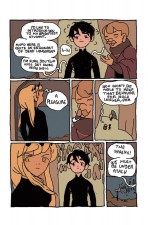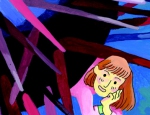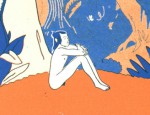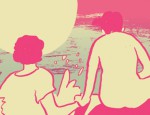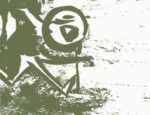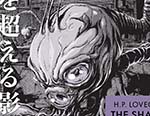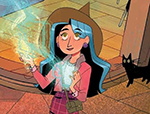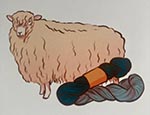The latest edition of the handsomely produced Czap Books anthology sets a very high standard and showcases a fine variety of strongly authored work.
One of the many titles to have made their debut at TCAF last weekend, the fourth edition of Kevin Czapiewski‘s indie anthology offers the traditional mixed bag. However, the strength of the book’s hits more than offsets its (near) misses.
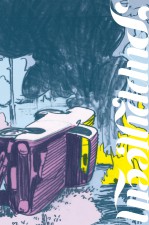 The jewel in the crown is Jess Wheelock‘s 14-page tale (pictured above) of the unlikely but moving relationship between Cassie, a student nurse working as a waitress, and Dee, a carousel horse who forms part of the decor in the branch of Applebee’s where she works. (Applebee’s doesn’t mean much to this Englander, but I’m guessing it’s something like an American version of Wetherspoons.)
The jewel in the crown is Jess Wheelock‘s 14-page tale (pictured above) of the unlikely but moving relationship between Cassie, a student nurse working as a waitress, and Dee, a carousel horse who forms part of the decor in the branch of Applebee’s where she works. (Applebee’s doesn’t mean much to this Englander, but I’m guessing it’s something like an American version of Wetherspoons.)
The story’s irresistible mix of the bizarre and the mundane is established in the first panel: “Everyone wants to start with the talking horse, but there are parts of this story that are quite ordinary”. And the relationship between the two is so beautifully depicted that we never even question its reality – so much so that one petty, hurtful act of vindictiveness on the part of Cassie is very affecting.
The strength of the story is reinforced by Wheelock’s strong artistic choices. The emphatic bluntness of her line has something of Rutu Modan about it, but it’s set off with a non-naturalistic, almost incandescent palette of red, orange and green (until the exquisite final panel).
As the story reaches its climax, there’s a real sense of peril and, by the final panel, a depth of emotional involvement that I rarely get from a comic, never mind a short piece in which one of the leads is a wooden horse. This is a little gem that could easily turn up in next year’s Best American Comics anthology
Picking up the silver medal is Laura Knetzger‘s 12-pager Closing the Circle, in which the artist explores her fantasy of some sort of technogeddon striking down civilisation, leaving ‘No laws but courtesy. Nothing but what you know and what your hands can make’.
As she pictures herself starting over and getting back to nature, she soon falls prey to more primal fears, shedding the idyllic pipe dream of simple agrarian life and slipping into a more savage iteration of the food chain. By the end, the terrible realisation dawns that human life is no less ephemeral than the artefacts of the digital culture that have been lost in her imagined future.
Coming a close third is the untitled eight-pager by Jenn Lisa that in effect opens the book. It’s a lightly told fable of the sudden, jolting responsibility of being a parent; when a father feels that he can’t cope with a new-born baby and a lonely hiker wishes they had something in their life to nurture, the universe intervenes to redress the balance.
It’s a simple little story, and while there’s nothing overly polished about Lisa’s cartooning style, she gives the story a lot of visual flair with some nice choices; it seems to be told on a number of Post-it notes, photographed on a backing board, and, like Jess Wheelock, she uses a bold but simple palette (blue ink and what looks like green highlighter pen) to give the story a strong visual identity.
The remaining two contributions didn’t strike quite the same chord with me, but both were still bold and interesting in their approach.
The eight-pager by Paula Almeida, a young Portugeuse cartoonist based in Brazil, read like a fragment of a much larger work. Depicting a galactic empire’s campaign of colonisation against an indigenous alien race, it hints at a much bigger story world, but the characterisation and set-up aren’t very clear.
However, the medium she uses is intriguing: it looks to my – admittedly untrained – eye as if the whole thing was created in a program like MS Paint. That gives it a compelling visual identity, but (as trivial as it sounds) the erratic lettering, while in style with the rest of the strip, is a bit of a turn-off.
Finally, the four strips above are punctuated by some interstitial pages by Jon Gott. These purport to be from a dossier hinting at some dark doings involving bridges around the city of Cleveland, but the overall significance of the enigmatic fragments escaped me.
I’m surprised I hadn’t come across Puppyteeth before; it’s a very nicely curated and produced showcase for some interesting work across a variety of styles. I wrote this review from a PDF copy, but the print version is perfect-bound (at 56 pages), and the strength of its material and design is clear, whatever format you choose to read it in.
Jenn Lisa, Jess Wheelock, Paula Almeida, Laura Knetzger, Jon Gott (W/A) • Czap Books, $12, May 2014





